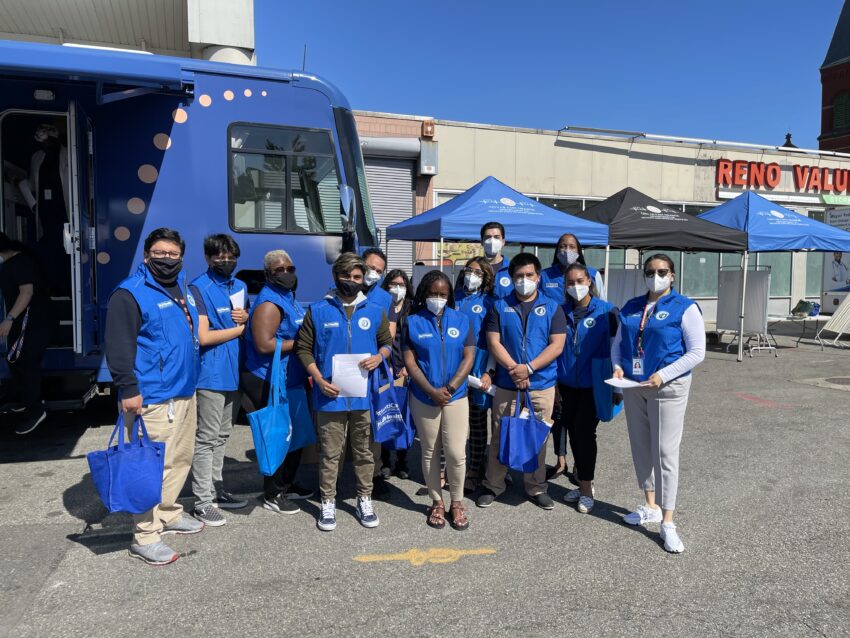
Share On Social!
COVID-19 continues to burden communities of color, particularly low-income and Latino immigrant populations.
Often, these communities have fewer resources and need support and health education to fight COVID-19.
That’s why groups like the COVID Community Corps (CCC) were started.
“It’s about getting into those really hard-to-reach populations and communities and bringing the information in a very linguistic and culturally competent manner,” said Nayeli Salazar de Noguera, the program outreach manager for the CCC.
Through canvassing and educational initiatives, the CCC aims to reach underserved communities and increase public confidence in and uptake of COVID-19 vaccines.
Learn how they are building vaccine confidence in low-vaccinated parts of New Jersey!
Launching the COVID Community Corps
Salazar de Noguera and her team at the New Jersey Department of Health launched the CCC in February 2021, a boots-on-the-ground program that would go out into the communities and talk to individuals.
“The purpose of it was to really help and assist with population outreach, specifically in really high-priority areas where we saw a large COVID-19 burden. And that’s really infection, hospitalization and deaths,” Salazar de Noguera said.
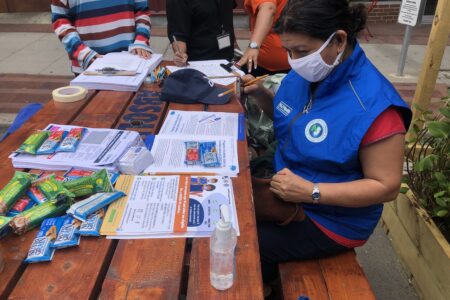
Throughout the pandemic, Latinos and immigrant populations are some of the hardest hit communities.
As of Jan. 19, 2022, Latinos comprise 24.5% of COVID-19 cases in the United States, second only to white people (55.4%), according to CDC data.
The fight against COVID-19 was personal for Salazar de Noguera, whose grandmother was hospitalized and narrowly avoided death.
“It really lit a fire in my heart and in my passion,” Salazar de Noguera told NBC New York.
The experience is part of what led her to start the CCC, which is based in her department of the Office of Minority and Multicultural Health and funded by the state’s Department of Health.
How the COVID Community Corps is Structured
The CCC is made up of over 300 volunteers who canvas neighborhoods across the state and educate community members about COVID-19 vaccination and safety precautions.
They have a three-pronged approach when it comes to their outreach:
- Education: Train trusted community members on COVID-19 disease burden, vaccine updates, and pathways to vaccine registration.
- Navigation: Assist vulnerable populations (e.g., minority groups, underserved communities, limited English proficiency populations, and individuals with limited technology and/or low proficiency) with the vaccination process.
- Activation: Reduce vaccine hesitancy among immigrant and minority populations through meaningful community partnerships and localized virtual and physical outreach.
How is the COVID Community Corps Fighting Vaccine Hesitancy?
David Carmona is the CCC’s volunteer lead for Hudson County, which borders the New York metro area and has a 42% Latino population.
“One of the things that we focus on for my county to reach to Latino communities is to establish those partnerships, those close connections with Latino-focused groups,” Carmona said.
He often spends his time educating people both in English and Spanish at community events and spreading information about COVID-19 testing and vaccination.
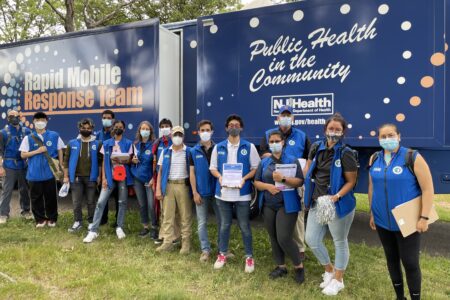
“I think one of the greatest strengths that we have is bringing it back to the open dialogue that we have with our community members, because anything that they say, we take their concerns, all of their comments on all the information that we provide,” Carmona said.
Through their community members, the CCC has established partnerships with libraries, food pantries, and faith-based organizations.
One of their most effective educational series is derived from the national Let’s Get Vaccinated campaign.
They broke it down to make the information about vaccines easier to digest in segments:
- Let’s Get Oriented – Explains what the CCC is and how to participate
- Let’s Get Educated – Understanding the components of the vaccine
- Let’s Get Connected – Learning soft skills to talk to community members and respect opinions
- Let’s Get Registered – Training people on how to find vaccines and testing
“Health education is the most important aspect of combating hesitancy, followed by canvassing and on-the-ground fieldwork, understanding what our communities are seeing and how they feel,” Salazar de Noguera said.
The Need for Booster Shots
As the pandemic has progressed in New Jersey and across the country with the spread of the Delta and Omicron variants, the CCC is emphasizing the need for booster shots in their communities.
“There was a survey that was put out recently by our poll center, and what we found was that 94% of adults hospitalized with COVID-19 had not received the booster. And similarly, within a 24-hour period, 96% of adults who had visited the emergency room for COVID-19 had not had a booster,” Salazar de Noguera said.
This data has shifted how the CCC talks about the vaccines with their community members.
“We’re changing our talking points to include this. This is not only a reason to get vaccinated, but to get your booster, to mitigate the severe illness, the severe symptoms, and the hospitalization,” Salazar de Noguera said.
Reaching the Latino Community
While New Jersey has over 240 languages and a wide diversity of immigrant communities, the CCC has a large focus on Spanish-language education and reaching Latino communities.
Both Carmona and Salazar de Noguera are Latino, which helps connect them to the communities they serve.
“A lot of the work has to do with taking CDC’s recommendations, taking CDC’s updates, looking at what we can align with the federal government, and then implement it to the communities in a way that’s culturally and linguistically competent,” Salazar de Noguera said.
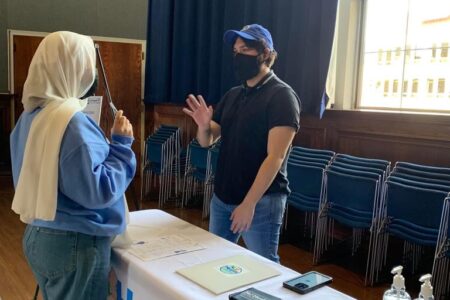 That also means tailoring their content to reach Latino parents and youth.
That also means tailoring their content to reach Latino parents and youth.
“We have a digital outreach worker, who is also of Latino descent, and she really focuses on those platforms, Facebook, TikTok, focusing more on youth,” Salazar de Noguera said.
They’ve also done outreach at consulates where they can reach immigrant communities.
“We work with consulates, like Ecuadorian or Mexican. We make sure that we have information tables for these events that that we cohost with, making sure that we have the right language, like culturally sensitive information,” Carmona said.
They also have honest conversations with Latinos in the community about what their hesitations or barriers are for getting vaccinated.
“Whether it’s structural, meaning ‘I can’t get to a vaccine appointment,’ ‘I don’t know where to find it.’ ‘It’s not in my language.’ Or cultural, whether it’s because ‘my religious leader believes it’s not prudent.’ We hear a lot of this ‘mark of the beast,’” Salazar de Noguera said.
It can be challenging when facing strong hesitancy from the community.
Keeping the conversation respectful and open helps the team build up their approach.
“Every time that we go out and canvass, we just take note of what people are saying, what are their fears or their hesitancies, and that’s just one of the many challenges. But it goes back to that open dialogue, making sure that it’s up to them if they want to get a vaccine, but it’s noting their concerns and leading them to the resources that can better answer their questions,” Carmona said.
Building trust for the future is also key, according to Salazar de Noguera.
“It’s building confidence in government, because we know that our communities are coming from countries where government might not be as trustworthy or may have a different perspective of what government does. The biggest hesitancy is related to time. People believe that the vaccines were developed too quickly, so it’s about reminding them these vaccines are now FDA approved. We are now a year and a couple of months into actual vaccine administration. We know that they’re effective, we know that the benefits outweigh the risks,” Salazar de Noguera said.
The Future for the COVID Community Corps
As the pandemic goes on, the CCC will continue to fight for health literacy and public confidence in the vaccine.
Eventually, they envision the group can be used for other health promotion initiatives.
“We hope that this model can be used for other outreach strategies. My wish is for chronic disease prevention. But for now, we’re here to just respond to COVID,” Salazar de Noguera said.
She’s glad the program has expanded and been successful so far.
“I’m really, really happy because this was supposed to be a pilot program that was just dedicated to volunteers. We were able to expand more and more and more, and it seems like it’s a well-oiled machine that now is going to be used or has been used in other states as a model,” Salazar de Noguera said.
To learn more about the CCC and volunteer in the community, visit https://covid19.nj.gov/pages/communitycorps.
What Can You Do to Promote Vaccine Confidence?
Vaccine misinformation is prominent and often targets Latinos.
Stay informed by learning the facts about COVID-19 and the vaccine.
One resource you can use is Salud America!’s Latino COVID-19 Vaccine “Change of Heart” Bilingual Storytelling Campaign. The campaign shares the stories of real Latinos who overcame misinformation, got the vaccine, reconnected with family, and are helping end the pandemic.
Rosa Herrera is one of the Latinas who was unsure about the vaccine initially. She was nervous it was produced too quickly and that it wouldn’t be safe.
But after learning more about the vaccine from her doctor, she decided to get it so she could protect her health and her family.
You can share Rosa’s story with your friends, family, and colleagues!
SHARE ROSA’S STORY IN ENGLISH!
SHARE ROSA’S STORY IN SPANISH!
Editor’s Note: Images provided by David Carmona of the COVID Community Corps.
By The Numbers
142
Percent
Expected rise in Latino cancer cases in coming years
This success story was produced by Salud America! with support from the Robert Wood Johnson Foundation.
The stories are intended for educational and informative purposes. References to specific policymakers, individuals, schools, policies, or companies have been included solely to advance these purposes and do not constitute an endorsement, sponsorship, or recommendation. Stories are based on and told by real community members and are the opinions and views of the individuals whose stories are told. Organization and activities described were not supported by Salud America! or the Robert Wood Johnson Foundation and do not necessarily represent the views of Salud America! or the Robert Wood Johnson Foundation.

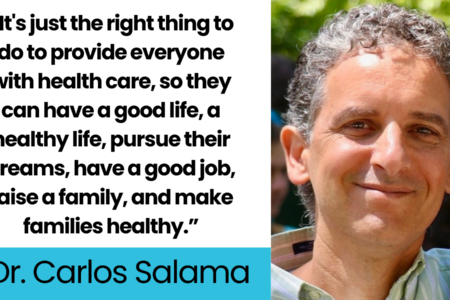

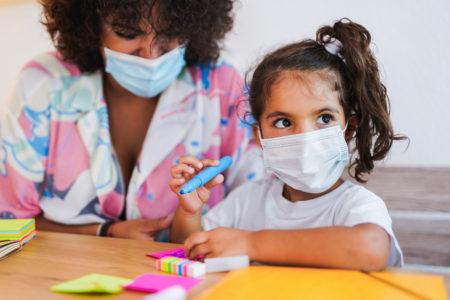
[…] The pandemic is another chapter in the bitter story of American racism and inequality. Black and Latinx people are being infected and are dying at much higher rates than white Americans. Many people of […]
[…] coronavirus has killed over 61,000 Latinos in America according to the CDC, accounting for over 18.2% of the total COVID deaths in the […]
[…] Whereas Hispanics make up 11% of D.C.’s inhabitants, they signify 19% of the COVID cases, and 14% of the deaths. Equally, 46% of D.C.’s residents are Black, they usually make up an alarming 75% […]
[…] and historical mistreatment. According to the U.S. Centers for Disease Control and Prevention, Latino and Black American communities are three times more likely to become infected with […]
[…] Covid pandemic has hit the Latino community particularly hard, and data from the nonprofit health equity advocacy group Salud America! shows Latinos lead in the 0-24 age […]
[…] the pandemic, Latinos took major blows, both in terms of COVID-19 cases and also from the economic recession under former President Donald Trump. Nearly half (49%) of […]
[…] the positive trend, the harm may have already been done. The pandemic has disproportionately impacted Latino communities. Reuters reported that election-related or political disinformation that […]
[…] pesar de la tendencia positiva, es posible que el daño ya esté hecho. La pandemia ha impactado desproporcionadamente Comunidades latinas. Reuters informó que la desinformación política o relacionada con las […]
[…] residentes blancos muestran una tasa mucho más baja con 10 muertes por cada 100,000 habitantes(8 9) . Los afroestadounidenses por su parte, denuncian subsistemas de salud que les segregan […]
[…] https://salud-america.org/coronavirus-case-rates-and-death-rates-for-latinos-in-the-united-states/ […]
[…] https://salud-america.org/coronavirus-case-rates-and-death-rates-for-latinos-in-the-united-states/ […]
[…] communities have the second-highest number of COVID-19 cases in the U.S. They’re also more likely to become hospitalized and die from the disease than other […]
[…] total, around 160,000 Latinos were killed by COVID-19. This accounts for 16% of the 1 million deaths in the country. The […]